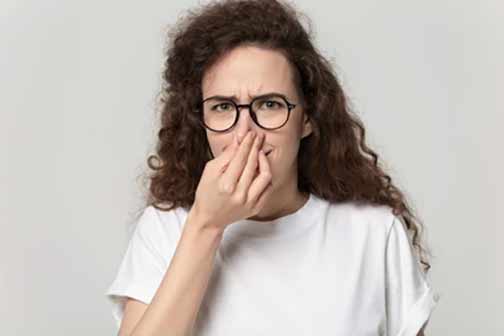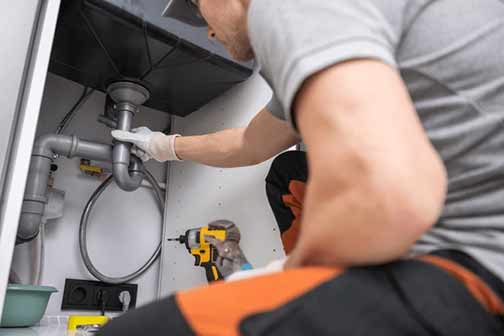
When you notice a foul smell emanating from your bathroom, it can be both alarming and unpleasant. Understanding the source of sewage odors is the first step in addressing the issue. These odors are typically caused by a buildup of gases such as hydrogen sulfide, ammonia, and methane, which are produced by the decomposition of organic matter in your plumbing system. Identifying the exact source of these gases is crucial to effectively eliminating the smell and preventing it from returning. This can involve inspecting various components of your plumbing system, from drains to vent pipes, to pinpoint the problem area.
Common Causes of Sewage Smells in Your Bathroom: Identifying the Culprits
Several factors can contribute to the presence of sewage odors in your bathroom. These include:
- Faulty P-Trap: The P-trap is a U-shaped pipe under your sink and other plumbing fixtures that holds water to prevent sewer gases from entering your home. If the P-trap is dry or malfunctioning, it can allow unpleasant odors to escape.
- Clogged Drains: Hair, soap scum, and other debris can accumulate in your drains, leading to blockages that trap stagnant water and organic matter, which then decomposes and produces foul smells.
- Vent Pipe Blockages: Vent pipes allow sewer gases to escape outside your home. If these pipes become blocked, the gases can be forced back into your bathroom.
- Sewer Line Issues: Problems with your main sewer line, such as cracks or blockages, can cause sewage to back up into your bathroom, resulting in unpleasant odors.
Faulty P-Trap: The Culprit Behind Unpleasant Bathroom Odors
The P-trap is an essential component of your bathroom’s plumbing system. It is designed to hold a small amount of water, which acts as a barrier to prevent sewer gases from entering your home. However, if the P-trap is faulty or dry, it can allow these gases to escape, leading to unpleasant odors in your bathroom.
To check if your P-trap is functioning correctly, you can pour a small amount of water down the drain and observe if the smell dissipates. If the odor persists, it may be necessary to inspect the P-trap for any signs of damage or leaks and replace it if needed. Regularly running water through infrequently used drains can also help ensure that the P-trap remains filled with water, thereby preventing sewer gases from entering your home.
Clogged Drains: A Major Contributor to Sewage Smells in Your Bathroom
Clogged drains are a common cause of sewage smells in the bathroom. Over time, hair, soap scum, and other debris can accumulate in your drains, leading to blockages that trap stagnant water and organic matter. As this trapped material decomposes, it produces foul-smelling gases that can escape into your bathroom.
To address clogged drains, you can use a plunger or a drain snake to remove the blockage. Additionally, regular cleaning and maintenance of your drains can help prevent future clogs and the associated odors. Using a mixture of baking soda and vinegar can also help break down any buildup in your pipes and keep them smelling fresh. For more stubborn clogs, you may need to use a commercial drain cleaner or have your drains professionally cleaned.

Regular cleaning and maintenance of your drains can help prevent future clogs and the associated odors.
Vent Pipe Blockages: An Overlooked Cause of Bad Bathroom Odors
Vent pipes play a crucial role in your plumbing system by allowing sewer gases to escape outside your home. However, if these pipes become blocked by debris, leaves, or even bird nests, the gases can be forced back into your bathroom, resulting in unpleasant odors.
To check for vent pipe blockages, you may need to climb onto your roof and inspect the vent openings. If you find any obstructions, carefully remove them to restore proper ventilation. In some cases, it may be necessary to call a professional plumber to thoroughly clean and inspect the vent pipes. Regularly inspecting and cleaning your vent pipes can help prevent blockages and ensure that sewer gases are properly vented outside your home.
Sewer Line Issues: When the Problem Lies Beyond Your Bathroom
Sometimes, the source of sewage odors in your bathroom may be due to issues with your main sewer line. Cracks, blockages, or other problems with the sewer line can cause sewage to back up into your bathroom, leading to unpleasant smells.
If you suspect that your sewer line is the source of the odor, it is essential to contact a professional plumber immediately. They can perform a thorough camera inspection of your sewer line using specialized equipment, such as video cameras, to identify any issues and recommend the appropriate repairs. Addressing sewer line problems promptly can help prevent further damage to your plumbing system and eliminate sewage odors from your bathroom.
Effective Solutions to Eliminate Sewage Odors from Your Bathroom
Once you have identified the source of the sewage odors in your bathroom, it is time to take action to eliminate them. Here are some effective solutions:
- Fixing Faulty P-Traps: Ensure that all P-traps in your bathroom are functioning correctly and holding water. Replace any damaged or leaking P-traps as needed.
- Clearing Clogged Drains: Use a plunger, drain snake, or a mixture of baking soda and vinegar to remove blockages and keep your drains clean.
- Unblocking Vent Pipes: Inspect and remove any obstructions from your vent pipes to restore proper ventilation.
- Repairing Sewer Line Issues: Contact a professional plumber to inspect and repair any problems with your main sewer line.
Implementing these solutions can help eliminate sewage odors from your bathroom and create a fresher, more pleasant environment. Regular maintenance and prompt repairs are key to preventing future odors and ensuring that your plumbing system functions properly.
Regular Maintenance: Key to Preventing Future Sewage Odors in Your Bathroom
Preventing sewage odors in your bathroom requires regular maintenance of your plumbing system. Here are some tips to keep your bathroom smelling fresh:
- Regular Cleaning: Clean your drains regularly to prevent the buildup of hair, soap scum, and other debris.
- Water Usage: Run water through infrequently used drains to ensure that the P-traps remain filled with water.
- Vent Pipe Inspection: Periodically inspect your vent pipes for any obstructions and remove them as needed.
- Professional Inspections: Schedule regular inspections with a professional plumber to identify and address any potential issues with your plumbing system.
By following these maintenance tips, you can help prevent sewage odors from developing in your bathroom and keep your home smelling fresh. Regular maintenance is essential for the long-term health of your plumbing system and can help you avoid costly repairs in the future.

Professional plumbers have the tools and expertise to diagnose and repair complex plumbing issues, ensuring that your bathroom remains free of sewage odors.
When to Call a Professional: Knowing When It’s Time for Expert Help
While some sewage odor issues can be resolved with DIY solutions, there are times when it is best to call a professional drain cleaning plumber. If you encounter any of the following situations, it is time to seek expert help:
- Persistent Odors: If the sewage smell persists despite your efforts to eliminate it, a professional plumber can perform a thorough inspection to identify the root cause.
- Sewer Line Problems: Issues with your main sewer line require specialized equipment and expertise to diagnose and repair.
- Complex Plumbing Issues: If you are unsure about the source of the odor or how to fix it, a professional plumber can provide the necessary guidance and solutions.
Knowing when to call a drain cleaning professional can save you time, money, and frustration. Professional plumbers have the tools and expertise to diagnose and repair complex plumbing issues, ensuring that your bathroom remains free of sewage odors.
Creating a Fresher Bathroom Environment: Tips for Long-Term Freshness
Eliminating sewage odors is essential for creating a fresher and more pleasant bathroom environment. By understanding the common causes of these odors and taking proactive steps to address them, you can ensure that your bathroom remains a clean and inviting space. Regular maintenance, prompt repairs, and professional assistance when needed will help you keep sewage smells at bay and enjoy a fresher home environment.
In addition to addressing plumbing issues, consider incorporating air fresheners, proper ventilation, and regular cleaning into your bathroom routine. These measures can help maintain a pleasant atmosphere and prevent the buildup of unpleasant odors. By taking a comprehensive approach to bathroom maintenance, you can create a space that is both functional and enjoyable for you and your family.